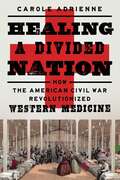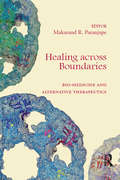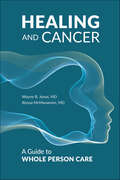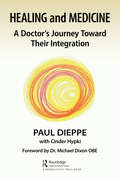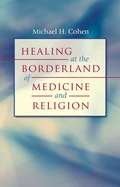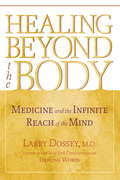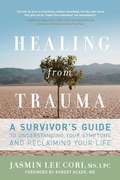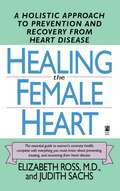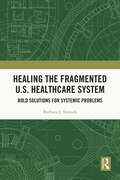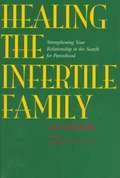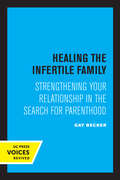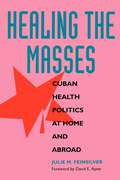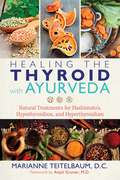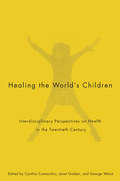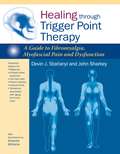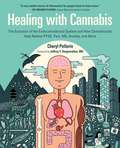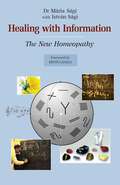- Table View
- List View
Healing a Divided Nation: How the American Civil War Revolutionized Western Medicine
by Carole AdrienneA profound and insightful investigation into how the American Civil War transformed modern medicine.At the start of the Civil War, the medical field in America was rudimentary, unsanitary, and woefully underprepared to address what would become the bloodiest conflict on U.S. soil. However, in this historic moment of pivotal social and political change, medicine was also fast evolving to meet the needs of the time. Unprecedented strides were made in the science of medicine, and as women and African Americans were admitted into the field for the first time. The Civil War marked a revolution in healthcare as a whole, laying the foundations for the system we know today. In Healing a Divided Nation, Carole Adrienne will track this remarkable and bloody transformation in its cultural and historical context, illustrating how the advancements made in these four years reverberated throughout the western world for years to come. Analyzing the changes in education, society, humanitarianism, and technology in addition to the scientific strides of the period lends Healing a Divided Nation a uniquely wide lens to the topic, expanding the legacy of the developments made. The echoes of Civil War medicine are in every ambulance, every vaccination, every woman who holds a paying job, and in every Black university graduate. Those echoes are in every response of the International and American Red Cross and they are in the recommended international protocol for the treatment of prisoners of war and wounded soldiers. Beginning with the state of medicine at the outset of the war, when doctors did not even know about sterilizing their tools, Adrienne illuminates the transformation in American healthcare through primary source texts that document the lives and achievements of the individuals who pioneered these changes in medicine and society. The story that ensues is one of American innovation and resilience in the face of unparalleled violence, adding a new dimension to the legacy of the Civil War.
Healing across Boundaries: Bio-medicine and Alternative Therapeutics
by Makarand R. ParanjapeThis unique volume initiates a dialogue between bio-medicine and alternative therapeutics. Undertaking a multidisciplinary exploration of the science and spirituality of healing and wellness, it offers varied perspectives from doctors, medical researchers, Ayurvedic practitioners, philosophers, psychologists, sociologists, and cultural critics. It expands the horizons of health sciences in engaging with diverse traditions — bio-medicine, Ayurveda, Siddha, and Jaina bio-ethics. The book will interest scholars and researchers in social and community medicine, biological sciences, sociology and social anthropology, as well as cultural studies.
Healing and Cancer: A Guide to Whole Person Care
by Wayne B. Jonas Alyssa McManamonHealing and Cancer strives to bring the concepts of healing and whole person care further into health care delivery so that people with cancer feel better and live longer. This important book places the concepts, science, delivery tools, and access to further resources for whole person care into the hands of cancer care teams for use with patients and caregivers. These days, cancer care generally focuses on attacking and killing the cancer cell—a laudable goal. However, if eliminating the tumor overshadows everything else, teams can lose sight of the care and healing of the person as a whole. This has great costs: for the person there are costs in time, money, side effects, and fear; and for the care team there are costs in the joy of practice, the energy to improve practice, and in overall vitality. Often, key patient needs are inadvertently pushed to the background for lack of time, tools, and resources. Moral injury and human suffering ensue. Advances in science have now clearly demonstrated that cancer does not develop in isolation, and its occurrence, progression and regression are largely influenced by the surrounding environment—the immune system, inflammation in the body, and things we ingest and are exposed to. By utilizing the methodologies and concepts outlined in this book, oncology teams can bring the full science of cancer biology into the care of the patient while inviting the person into full engagement in their own care. Doing so, they will have achieved the highest quality of care for people diagnosed with cancer. Care teams that practice deep listening—up front and early on—to patients as people move beyond patient-centered care to person-centered and whole person care. With increasing numbers of survivors of cancer and the intensity and duration of relationships in oncology, cancer care is a field uniquely positioned to further the uptake of whole-person care and to join colleagues in primary care who are doing the same. Healing and Cancer first defines what whole person cancer care is, and drawing on examples from around the world, illustrates how and why it needs to be standard in all of oncology. The authors describe the science behind whole person care and the evidence that supports its application, including real-world examples of how it&’s being done in small clinics and large institutions, both academic and community-based. Finally, Healing and Cancer directs readers to the best tools and resources available so that cancer care teams, primary care clinicians, integrative practitioners and those with cancer can incorporate whole person care into the healing journey. Healing and Cancer is intended to be read and actively used by teams caring for people with cancer and by caregivers and patients themselves to enhance healing, health, and wellbeing.
Healing and Medicine: A Doctor's Journey Toward Their Integration
by Paul DieppeHealing is on many people’s minds today. In the wake of the COVID-19 pandemic and a host of other disruptions and disasters, many of us feel that we need healing – in our personal lives, for the environment and for our planet. But healing is rarely defined and is not an accepted part of medicine in the West. This book examines the relationship between healing and medicine through the eyes of an academic physician who changed his interests from biomedical research to healing late in his career in medicine. It is based on his experiences and stories of his encounters with patients, practitioners and others for whom healing has had a particular significance, as well as his rigorous research into the subject. A central theme of the book is that modern medicine needs to be more pluralistic in its approach to health and accept that spirituality and healing techniques have roles to play alongside scientific medicine, which currently has its base in materialism alone.
Healing at the Borderland of Medicine and Religion
by Michael H. CohenOne of the transformations facing health care in the twenty-first century is the safe, effective, and appropriate integration of conventional, or biomedical, care with complementary and alternative medical (CAM) therapies, such as acupuncture, chiropractic, massage therapy, herbal medicine, and spiritual healing. In Healing at the Borderland of Medicine and Religion, Michael H. Cohen discusses the need for establishing rules and standards to facilitate appropriate integration of conventional and CAM therapies. The kind of integrated health care many patients seek dwells in a borderland between the physical and the spiritual, between the quantifiable and the immeasurable, Cohen observes. But the present environment fails to present clear rules for clinicians regarding which therapies to recommend, accept, or discourage, and how to discuss patient requests regarding inclusion of such therapies. Focusing on the social, intellectual, and spiritual dimensions of integrative care and grounding his analysis in the attendant legal, regulatory, and institutional changes, Cohen provides a multidisciplinary examination of the shift to a more fluid, pluralistic health care environment.One of the transformations facing health care in the twenty-first century is the safe, effective, and appropriate integration of conventional (or biomedical) care with complementary and alternative medical (CAM) therapies, such as acupuncture, chiropractic, massage therapy, herbal medicine, and spiritual healing. Michael H. Cohen discusses the need for establishing rules and standards to facilitate appropriate integration of conventional and CAM therapies. The kind of integrated health care many patients seek dwells in a borderland between the physical and the spiritual. But the present environment fails to present clear rules for clinicians regarding which therapies to recommend, accept, or discourage, and how to discuss patient requests regarding inclusion of such therapies. Focusing on the social, intellectual, and spiritual dimensions of integrative care and grounding his analysis in the attendant legal, regulatory, and institutional changes, Cohen provides a multidisciplinary examination of the shift to a more fluid, pluralistic health care environment.-->
Healing beyond the Body: Medicine and the Infinite Reach of the Mind
by Larry DosseyDoes the mind produce consciousness--or transmit it? Can machines detect love? Why has job stress become a worldwide epidemic? Why do objects sometimes seem to have minds of their own? Could war be a biological condition? Dr. Larry Dossey, one of the most influential spokespersons for the role of consciousness and spirituality in medicine, tackles all these questions and more with clarity and wit. In this book, he explores the relationship--often documented in extensive research--between science and "unscientific" topics such as prayer, love, laughter, war, creativity, dreams, and immortality.
Healing from Trauma: A Survivor's Guide to Understanding Your Symptoms and Reclaiming Your Life
by Jasmin CoriWhile there are many different approaches to healing trauma, few offer a wide range of perspectives and options. With innovative insight into trauma-related difficulties, Jasmin Lee Cori helps you: Understand trauma and its devastating impacts Identify symptoms of trauma (dissociation, numbing, etc. ) and common mental health problems that stem from trauma Manage traumatic reactions and memories Create a more balanced life that supports your recovery Choose appropriate interventions (therapies, self-help groups, medications and alternatives) Recognize how far you’ve come in your healing and what you need to keep growing Complete with exercises, healing stories, points to remember, and resources, this is a perfect companion for anyone seeking to reclaim their life from the devastating impacts of trauma.
Healing in the 21st Century: Complementary Medicine and Modern Life
by Jan de VriesBased on the combined works and extensive knowledge of Jan de Vries, Dr Carl Heede and Marie-Louise Schicht, this book provides guidelines on how to treat diseases associated with modern society. The author suggests that many of the diseases must be addressed in a new way - in treating twenty-first century diseases, a twenty-first century approach is needed. At the same time, de Vries reminds us of the great scientific pioneers of the past whi understood and used the gift s of nature to alleviate human suffering. He explores the possibility of going back to the grass roots of medicine in order to regain good health. Healing in the 21st century will be an eye-opener for those working in the medical profession. The author demonstrates that a multi-disciplinary approach, combining orthodox and conventional, old and new, medicine is not only possible but necessary. Part of the successful Jan de Vries Healthcare series, this book is an outstanding and authoritative manual, a must for anybody interested in attaining and maintaining good health.
Healing the Baby Doc's Heart
by Fiona McArthurThe last thing this neonatal nurse needs is to develop feelings for her devastatingly handsome new colleague! But can she resist the pediatrician? Find out in the latest Medical Romance from Fiona McArthur! BENEATH THE PEDIATRICIAN&’S BROODING FACADE… Neonatal nurse Isabella has dropped everything to rush back to Australia to be with her dying grandmother and pregnant sister. But her new role on the NICU quickly leads her to cross swords with guarded, handsome neonatal doc Simon! He&’s the exact type she&’s learned to avoid—a commitment-phobic workaholic. Until Isabella sees behind this widower&’s walls to a heart that needs healing… Could they be each other&’s chance for a happy future?From Harlequin Medical: Life and love in the world of modern medicine.
Healing the Baby Surgeon's Heart
by Tessa ScottIn Tessa Scott&’s Harlequin Medical Romance debut, a heartbroken neonatal surgeon on the brink of leaving her profession meets a hunky Irish surgeon, and soon she finds her impossible choice has become even more complicated… A LUCKY ENCOUNTER? For neonatal surgeon Claire, finding joy in the miracle of birth isn&’t easy these days. Not after her husband walked out on their marriage, and she devastatingly lost their baby daughter. Now she&’s in Ireland trying to decide whether to return to her career in Boston, and meeting hunky, rugby-playing surgeon Kiernan isn&’t part of the plan! Neither is the possibility that the committed bachelor could soothe the sharp edges of her grief. And as the passion between them brings Claire back to life, she begins to think of the future—with Kiernan in it…From Harlequin Medical: Life and love in the world of modern medicine.
Healing the Female Heart: A Holistic Approach to Prevention and Recovery From Heart Disease
by Elizabeth RossCoronary heart disease is the number one killer of American women. Every year in this country, six times as many women die from heart attacks as from breast cancer. Yet the symptoms of women's heart disease are often misunderstood and misdiagnosed by doctors, and women themselves may grossly underestimate their own risk for heart problems. When they do receive treatment, women are frequently older and sicker than their male counterparts, and as a result, much less likely to recover fully. Healing the Female Heart, women's cardiologist Elizabeth Ross equips you not only with the medical knowledge you need - of risk factors, the tests used to diagnose heart disease, and the treatments used to manage it - but with holistic guidance that will help you give your heart the best possible attention. You'll learn how to get astute medical care as well as how to nourish your inner self, so that the mind-body connection works for your heart's health, not against it. With this holistic approach, you can keep your heart beating strong - for a happier, fuller, longer life.
Healing the Fragmented U.S. Healthcare System: Bold Solutions for Systemic Problems
by Barbara SowadaThrough a systems perspective, this insightful book challenges the current state of healthcare in the United States, arguing for overarching reforms that would lead ultimately to universal healthcare coverage across the country.Written by the president of the board of trustees of a rural hospital, the book highlights the chronic issues facing American healthcare today, namely high costs, poor health outcomes, excessive health inequalities, and a lack of trust. It uses systems thinking principles – used in hospitals themselves to improve efficiency, quality, and safety of care – to show how the fragmented system could be transformed by addressing these issues holistically. The book also gives suggestions for rebuilding trust, respect, and mutual cooperation, issues which are also critical in healing the current system.Grounded in the author’s direct experience in facing the challenges of dealing with a fragmented system in America today, this perceptive book will interest graduate students in healthcare administration, policy, or leadership programs, as well as scholars in these and related fields.
Healing the Infertile Family: Strengthening Your Relationship in the Search for Parenthood
by Gay BeckerAn examination of the strain that infertility can put on interpersonal relationships.
Healing the Infertile Family: Strengthening Your Relationship in the Search for Parenthood
by Gay BeckerUnlike most infertility books that focus on medical treatment, Healing the Infertile Family examines the social and emotional problems experienced by couples confronting infertility and suggests how they can be alleviated. In this updated edition, Gay Becker discusses her most recent study of couples experiencing infertility and offers guidelines for resolution of this common problem that will enable couples to face the future with hope. This title is part of UC Press's Voices Revived program, which commemorates University of California Press’s mission to seek out and cultivate the brightest minds and give them voice, reach, and impact. Drawing on a backlist dating to 1893, Voices Revived makes high-quality, peer-reviewed scholarship accessible once again using print-on-demand technology. This title was originally published in 1990.
Healing the Masses: Cuban Health Politics at Home and Abroad
by Julie M. FeinsilverHow has Cuba, a small, developing country, achieved its stunning medical breakthroughs? Hampered by scarce resources and a long-standing U.S. embargo, Cuba nevertheless has managed to provide universal access to health care, comprehensive health education, and advanced technology, even amid desperate economic conditions. Moreover, Cuba has sent disaster relief, donations of medical supplies and technology, and cadres of volunteer doctors throughout the world, emerging, in Castro's phrase, as a "world medical power."In her significant and timely study, Julie Feinsilver explores the Cuban medical phenomenon, examining how a governmental obsession with health has reaped medical and political benefits at home and abroad. As a result of Cuba's forward strides in health care, infant mortality rates are low even by First World standards. Cuba has successfully dealt with the AIDS epidemic in a manner that has aroused controversy and that some claim has infringed on individual liberties—issues that Feinsilver succinctly evaluates.Feinsilver's research and travel in Cuba over many years give her a unique perspective on the challenges Cuba faces in this time of unprecedented economic and political uncertainty. Her book is a must-read for everyone concerned with health policy, international relations, and Third World societies.
Healing the Sheikh's Heart (Paddington Children's Hospital #5)
by Annie O'NeilA doctor for the desert king Brooding billionaire Sheikh Idris Al Khalil wants one thing-the gift of hearing for his daughter, Amira-and he's willing to pay anything to get it! Enter Dr. Robyn Kelly, whose whirlwind approach to life sends his senses into overdrive. Now, as the tension between Paddington's ENT specialist and the guarded sheikh mounts, Robyn can't help but wonder...is life in the desert with Idris and little Amira the family happy-ever-after she's always dreamed of?
Healing the Single Dad Surgeon
by Sue MacKayCould his son&’s gorgeous nurse be the piece the single dad didn&’t know they needed to complete their little family? Find out in Sue MacKay&’s latest medical romance! MR. GRUMPY, MS. SUNSHINE—THE PERFECT FAMILY? Anna loves nursing children. It&’s healing after having to give her own baby up for adoption. Her favorite patient is Jordan, an adorable boy who has Down Syndrome. Caring for him is rewarding—especially when she meets his handsome single dad, surgeon Eli! Since his ex-wife abandoned them, Eli&’s very protective of his son. But as he gets to know Anna, he sees Jordan&’s in safe hands. Soon, her warm and sunny nature breaks through Eli&’s emotional barricade. And an unexpected bond slowly fills them both with hope…From Harlequin Medical: Life and love in the world of modern medicine.
Healing the Thyroid with Ayurveda: Natural Treatments for Hashimoto’s, Hypothyroidism, and Hyperthyroidism
by Marianne TeitelbaumA comprehensive guide to addressing the growing epidemic of thyroid disease from the perspective of the Ayurvedic tradition • Details the author’s successful treatment protocols for Hashimoto’s thyroiditis, hypothyroidism, and hyperthyroidism developed over more than 30 years of Ayurvedic practice • Explores the underlying causes of thyroid malfunction, the thyroid’s connections to the liver and gall bladder, and the importance of early detection • Also includes treatments for common symptoms of thyroid disease, such as insomnia, depression, fatigue, and osteoporosis, as well as for weight loss and hair growth In this comprehensive guide for practitioners and those concerned with thyroid health, Marianne Teitelbaum, D.C., integrates the ancient medicine of Ayurveda with modern scientific findings to address the growing epidemic of thyroid disease. Revealing how the thyroid is the victim of many factors that conspire to create ill health--and how many cases of thyroid disease go undiagnosed--Teitelbaum focuses not only on treating thyroid problems and symptoms but also on diagnosing them at their earliest, most reversible stages. She outlines the basic principles of Ayurveda, including pulse diagnosis, a key tool for early detection, and explains the successful treatment protocols she has developed over more than 30 years of Ayurvedic practice. She details the underlying reasons for thyroid malfunction, such as inflammation, malnutrition, and toxins, and how the thyroid is connected with the health of the rest of body, including the liver and gall bladder. She explores the Ayurvedic treatment of thyroid-related conditions, such as Hashimoto’s thyroiditis, hypothyroidism, and hyperthyroidism, offering guidance on the targeted use of herbs, specific dietary recommendations, proper detoxification, and Ayurvedic recipes. She also includes treatments and remedies for common symptoms of thyroid disease, including insomnia, depression, fatigue, and osteoporosis, as well as for luxurious hair growth and weight loss. Based on the treatment of thousands of patients, this book also shares success stories of thyroid healing and the scientific studies that support the author’s Ayurvedic thyroid protocols. Offering an easy-to-follow yet comprehensive guide, Teitelbaum shows that optimum thyroid health as well as overall health are within everyone’s reach.
Healing the World's Children
by George Weisz Cynthia Comacchio Janet GoldenEssays range from historical overviews and historiographic surveys of children's health in various regions of the world, to disability and affliction narratives - from polio in North American to AIDS orphans in post-Apartheid South Africa - to interpretations of artistic renderings of sick children that tell us much about medicine, family, and society at specific times in history.
Healing the World's Children: Interdisciplinary Perspectives on Child Health in the Twentieth Century (McGill-Queen's/Associated Medical Services Studies in the History of Medicine, Health, and Society #77)
by George Weisz Cynthia Comacchio Janet GoldenEssays range from historical overviews and historiographic surveys of children's health in various regions of the world, to disability and affliction narratives - from polio in North American to AIDS orphans in post-Apartheid South Africa - to interpretations of artistic renderings of sick children that tell us much about medicine, family, and society at specific times in history.
Healing through Trigger Point Therapy: A Guide to Fibromyalgia, Myofascial Pain and Dysfunction
by Amanda Williams Devin J. Starlanyl John SharkeyThis book is about empowerment for chronic pain patients and care providers alike. Every chronic pain condition has a treatable myofascial trigger point component, including fibromyalgia. Many of the localized symptoms now considered as fibromyalgia are actually due to trigger points. The central sensitization of fibromyalgia amplifies symptoms that trigger points cause, and this book teaches care providers and patients how to identify and treat those causes. Chronic myofascial pain due to trigger points can be body-wide, and can cause or maintain fibromyalgia central sensitization. Trigger points can cause and/or maintain or contribute to many types of pain and dysfunction, including numbness and tingling, fibromyalgia, irritable bowel syndrome, plantar fasciitis, osteoarthritis, cognitive dysfunctions and disorientation, impotence, incontinence, loss of voice, pelvic pain, muscle weakness, menstrual pain, TMJ dysfunction, shortness of breath, and many symptoms attributed to old age or "atypical" or psychological sources. Trigger point therapy has been around for decades, but only recently have trigger points been imaged at the Mayo Clinic and National Institutes of Health. Their ubiquity and importance is only now being recognized. Devin Starlanyl is a medically trained chronic myofascial pain and fibromyalgia researcher and educator, as well as a patient with both of these conditions. She has provided chronic pain education and support to thousands of patients and care providers around the world for decades. John Sharkey is a physiologist with more than twenty-seven years of anatomy experience, and the director of a myofascial pain facility. Together they have written a comprehensive reference to trigger point treatment to help patients with fibromyalgia, myofascial pain, and many other conditions. This guide will be useful for all types of doctors, nurses, therapists, bodyworkers, and lay people, facilitating communication between care providers and patients and empowering patients who now struggle with all kinds of misunderstood and unexplained symptoms. Part 1 explains what trigger points are and how they generate symptoms, refer pain and other symptoms to other parts of the body, and create a downward spiral of dysfunction. The authors look at the interconnection between fibromyalgia and myofascial trigger points and their possible causes and symptoms; identify stressors that perpetuate trigger points such as poor posture, poor breathing habits, nutritional inadequacies, lack of sleep, and environmental and psychological factors; and provide a list of over one hundred pain symptoms and their most common corresponding trigger point sources. Part 2 describes the sites of trigger points and their referral patterns within each region of the body, and provides pain relief solutions for fibromyalgia and trigger point patients and others with debilitating symptoms. Pain treatment plans include both self-help remedies for the patient--stretching or postural exercises, self-massage techniques and prevention strategies--as well as diagnostic and treatment hints for care providers. Part 3 offers guidance for both patients and care providers in history taking, examination, and palpation skills, as well as treatment options. It offers a vision for the future that includes early assessment, adequate medical training, prevention of fibromyalgia and osteoarthritis, changes to chronic pain management and possible solutions to the health care crisis, and a healthier version of our middle age and golden years, asserting that patients have a vital role to play in the management of their own health.From the Trade Paperback edition.
Healing with Artificial Intelligence
by Daniele CaligioreDiagnosis through images, robot surgeons, digital twins, and the metaverse are some of the applications in which artificial intelligence (AI) is involved. It is an almost sci-fi world that touches us closely and toward which we can harbor both great hopes and great fears. Health, in fact, is a central theme, and understanding how this new technology can help us to heal, acquire well-being, and live better is certainly important. This book, thanks to the author’s great experience, deals comprehensively and accessibly with the benefits and risks of using AI in the field of health. It will enable the reader to confidently approach a revolution that will change the way we treat ourselves.
Healing with Cannabis: The Evolution of the Endocannabinoid System and How Cannabinoids Help Relieve PTSD, Pain, MS, Anxiety, and More
by Cheryl PellerinAn Informative Read for an Audience Interested in Why and How Medical Cannabis Helps Treat a Range of Illnesses—Maybe All of Them With cannabis approved in fourteen states (including the District and two US territories), medical cannabis approved in at least 35 states, and hemp (very-low-THC cannabis) off the controlled substances list, millions now treat their ills with medical cannabis or non-intoxicating cannabinoids like CBD. But lots of them don&’t know why or how cannabis works in the body. Healing with Cannabis informs readers about an ancient biological system newly discovered in every vertebrate on the planet—the endocannabinoid system. This system is the only reason cannabis works in the body, and it&’s why cannabis is effective in a broad range of disorders. The book offers an informal tone, a little humor, interviews with some of the most knowledgeable cannabinoid scientists, color images, and a selection of research and clinical trials to recount the story of the endocannabinoid system, its origins in the earliest forms of life on Earth, the evolution of its elements, and the discoveries, millions of years later, of more of its elements over time. Healing with Cannabis explains the surprising reasons evolution conserved the endocannabinoid system over a billion years and tells specifically how cannabis has positive effects on some of society&’s most devastating illnesses, including neurodegenerative diseases, post-traumatic stress disorder, pain, movement disorders, cancer and chemotherapy, and addiction. The book also shows how medical cannabis, widely available, will change the face of public health, and how nearly everyone can benefit from this versatile medicine that has a 5,000-year history of safe and effective use.
Healing with Herbs and Rituals: A Mexican Tradition
by Torres Eliseo “Cheo”Healing with Herbs and Rituals is an herbal remedy-based understanding of curanderismo and the practice of yerberas, or herbalists, as found in the American Southwest and northern Mexico. Part One, Folk Healers and Folk Healing, focuses on individual healers and their procedures. Part Two, Green Medicine: Traditional Mexican-American Herbs and Remedies, details traditional Mexican-American herbs and cures. These remedies are the product of centuries of experience in Mexico, heavily influenced by the Moors, Judeo-Christians, and Aztecs, and include everyday items such as lemon, egg, fire, aromatic oil, and prepared water. Symbolic objects such as keys, candles, brooms, and Trouble Dolls are also used. Dedicated, in part, to curanderos throughout Mexico and the American Southwest, Healing with Herbs and Rituals shows us these practitioners are humble, sincere people who have given themselves to improving lives for many decades. Today's holistic health movement has rediscovered the timeless merits of the curanderos' uses of medicinal plants, rituals, and practical advice.
Healing with Information: The New Homeopathy
by Maria SagiWith the discovery of information as the basic &‘software&’ of living systems came the realization that malfunction in the living system can be treated by correcting the information that causes the malfunction. With this milestone book by a long-standing practitioner of this new kind of medicine, the door is opened to every healer and physician to complement his or her healing practice by diagnosing the cause of their patients&’ health problems before they manifest as disease, and correcting the malfunction with non-invasive, testable and reproducible &‘soft&’ methods. This is information medicine, the cutting edge in the development of modern medical science; not an alternative to the tried and tested methods of biochemical medicine but a remarkably effective and readily acquired complement to it.
